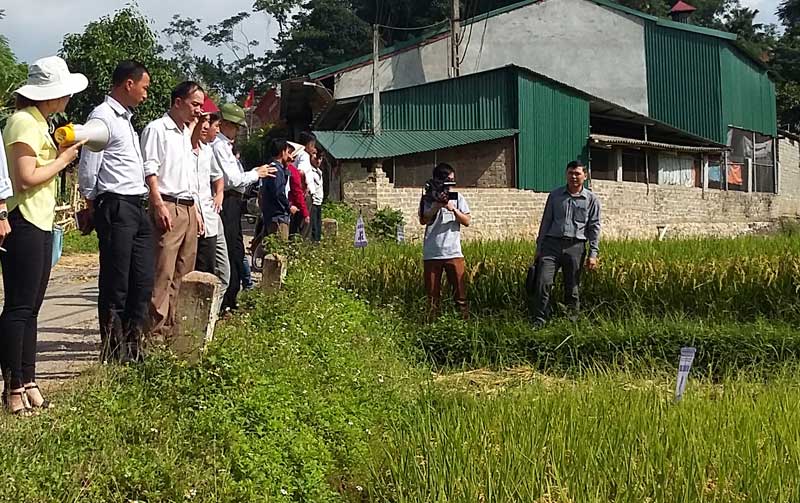
(HBO) –Those who had a chance to taste Muong Chieng rice in Da Bac district, Hoa Binh province, are sure to remember its good taste. If cooked with a right water ratio, the rice is fragrant and soft, which tastes good even with only fish sauce. It is the reason why anyone who goes on working trips to Muong Chieng looks to buy this kind of rice to bring home.

Xa Van Lam, head of Ban Ha hamlet,
said the rice is good for both home use and selling. People from other localities
buy this rice for use at home or as gift. Local farmers now want to cultivate
only this rice variety – called the J02, which is planted in almost all areas
of farming land in the commune. Rice fields in the locality are green with nice
fragrance coming into hamlets.
"My family has 3,000 sq.m of rice
fields. We harvested 40 bags of rice, each weighing
45 kg, which translated into
a productivity of more than 8 tonnes of rice per ha during the past
winter-spring crop,” he said, adding that J02 has become a special rice variety
of Muong Chieng. The commune now has
14.5 ha of land cultivated with this rice
variety.
Xa Van Hung, Chairman of the Muong Chieng People’s Committee, said water
rice is the main plant of Muong Chieng commune where weather and soil
conditions are suitable for rice cultivation. Agriculture is the traditional
means of living, and local farmers are hard-working. In the past, locals used
to cultivate hybrid rice varieties such as Nhi uu 838, which had stable
productivity but rice seeds and cultivation materials cost a lot. Over the past
several years, the commune piloted J02, a purebred rice variety provided by the
Agricultural Genetics Institute. With the support of the district, in the 2017
spring crop, Muong Chieng continued to cultivate the rice variety in
8 ha of land with the
participation of 50 households in Na Muoi, Ban Ha, Na Phang and Na Nguom
hamlets.
Hoa Binh province’s economy posted an impressive Gross Regional Domestic Product (GRDP) growth rate of 12.67% in the first quarter of 2025, representing a 12.76% year-on-year increase, the highest rate recorded since the beginning of the current tenure, according to the provincial Statistics Office. This robust growth reflects years of strategic groundwork and sets a strong foundation for the province’s annual growth target of over 10%.
With a focus on cash crop farming with science - technology application and brand building, Lac Thuy district is gradually increasing production value, improving people's life quality, and laying the foundation for sustainable socio-economic development.
In recent years, the economic development model "Hoa Binh Earthworm Farm” run by Mr. Bui Van Dang in Co Giua Hamlet, My Thanh Commune (Lac Son district) has not only brought stable economic value but it is also environmentally friendly, helping to protect and reduce pollution, contributing to the construction of a green and sustainable agriculture.
Dao Village’s honey – a product certified with a 3-star OCOP (One Commune One Product) rating by Thong Nhat Agricultural Cooperative in Dao Village (Hoa Binh City) – is highly regarded by consumers for its quality, richness, and variety in packaging. The distinctively sweet taste of Dao Village’s honey leaves a lasting impression on anyone who has tried it.
In alignment with Project No. 07-DA/TU, issued by the Hoa Binh provincial Party Committee on November 1, 2021, Lac Thuy district has actively promoted investment and supported the sustainable development of its industrial and handicraft sectors during the 2021–2025 period. Alongside this, the district has remained committed to preserving and revitalising traditional craft villages.
Located in the northern part of Lac Thuy district, with a temperate climate and fertile soil, Phu Thanh commune has great potential and advantages in growing tea. The long-standing experience, combined with strict adherence to organic farming practices in the tea gardens, ensures that the dried tea products from Phu Thanh and Lac Thuy as a whole are sold out immediately upon production, providing a stable and prosperous life for the local people.



